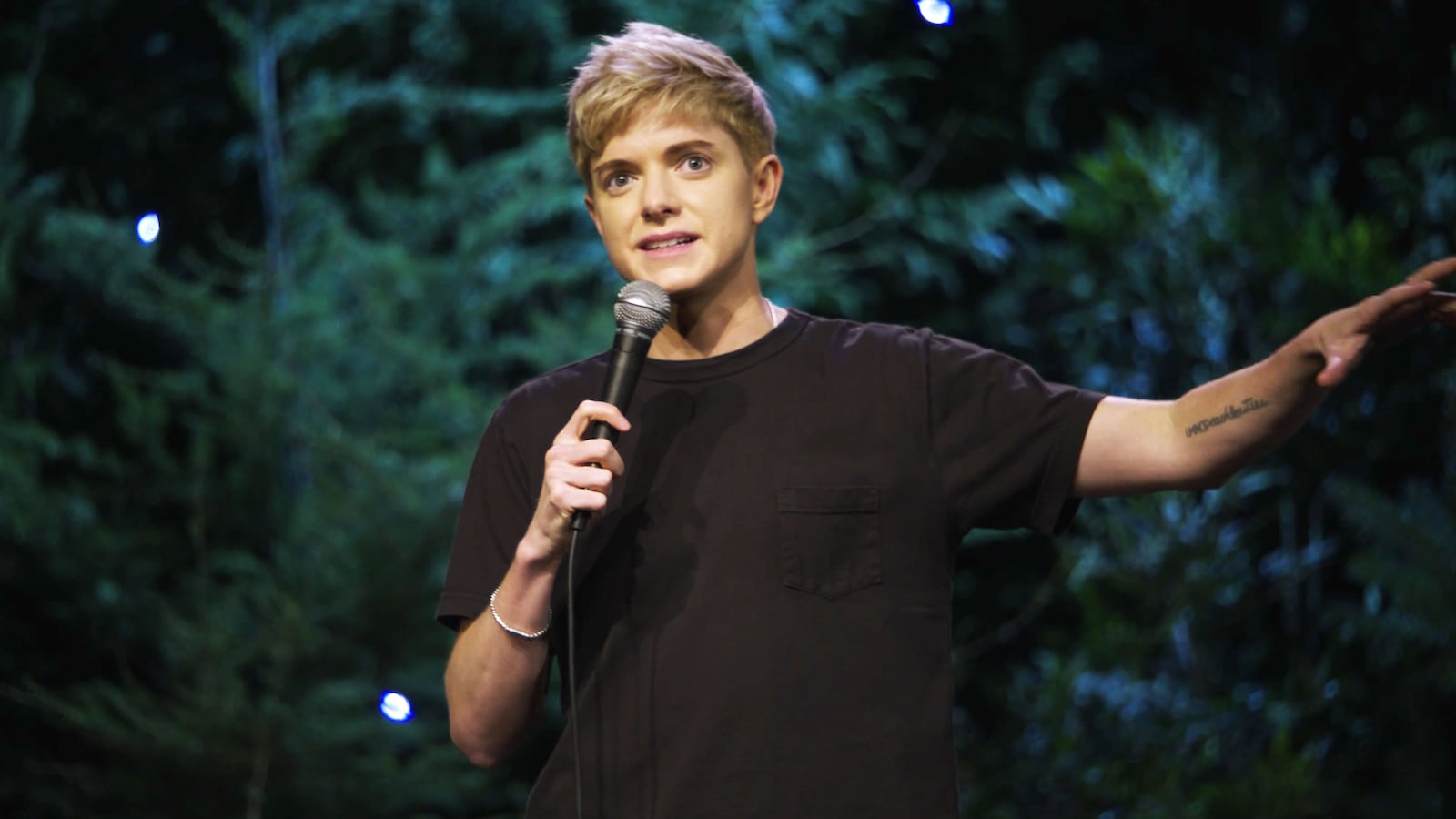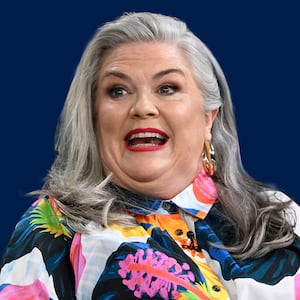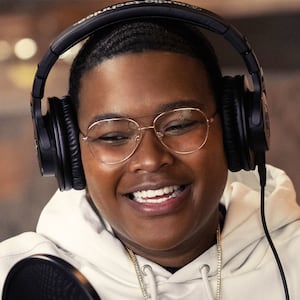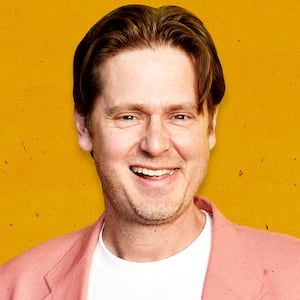At just 35 years old, Mae Martin has been performing stand-up for more than two decades—from their teenage years at open mic nights in the Toronto comedy scene, to hit one-person shows at the Edinburgh Fringe Festival, to their first-ever hourlong special SAP, which was directed by Abbi Jacobson and premieres today on Netflix.
In this episode of The Last Laugh podcast, Martin talks about everything it took to get to this huge moment in their career, including what they learned about themselves making the autobiographical Netflix series Feel Good; the difficult decision to come out as gender nonbinary, both on the show and in real life; and what they make of the rise of anti-trans comedy from some of America’s most popular comedians.
In the week leading up to their big special premiere, Martin has been running around Los Angeles, working in the writers’ room for a new thriller-comedy they’re creating while also trying to do press for Netflix. The comedian’s late-night TV debut with Stephen Colbert was scuttled at the last minute when they arrived in New York and promptly tested positive for COVID.
“Yeah, I went all the way to New York and then sat in a hotel room for three days,” Martin says. “And I’ve never done a late-night show. I was so pumped because I’m a big fan of his.”
As the premiere of SAP approaches, Martin admits they are “really nervous” about how it will be received. “It’s always scary putting something out in the world,” they tell me. “I’m kind of compartmentalizing it and burying my head in the sand because it’s too scary. But I’m excited. I toured the show for a while and I had so much fun doing it. So yeah, I hope people like it.”
The special comes nearly two years after Feel Good ended its two-season run on Netflix. Now, Martin says they would have loved to make a third had it been on the table.
“If they had said, ‘We’ll give you a third season,’ I would have been overjoyed and I definitely would have had some ideas for more story,” they say. “But I’m really happy with how it turned out because, in retrospect, to keep going would just be torturing that couple so much. They’d have to start behaving in ways that weren’t in keeping with their characters and that relationship. It was good to leave them in a good place and resolve some of the trauma in a very neat way that doesn’t really happen in life.”
Martin can’t say too much about the new show they’re working on, but does describe it as a “comedy thriller about two teenage girls who are sent to a rehab behavioral therapy school in the woods, and it turns out to be much more nefarious than that.” Stepping back from the spotlight, Martin plays a supporting character who lives in the nearby town and is “unraveling the mystery” at the center of the story.
“The whole thing has been a learning curve,” the Canadian comedian and actor says, “but it’s been really fun. It has all the themes that interest me about adolescents and intergenerational conflict and identity and all that. So I hope it happens.”
Below is an edited excerpt from our conversation. You can listen to the whole thing by subscribing to The Last Laugh on Apple Podcasts, Spotify, Google, Stitcher, Amazon Music, or wherever you get your podcasts, and be the first to hear new episodes when they are released every Tuesday.
In the second season of Feel Good, one of the storylines is that your character comes to this realization that they are gender nonbinary, which I thought was handled so beautifully on the show. And you also decided to come out publicly as nonbinary in 2021. What were the most challenging or unexpected parts of that experience, of making that statement on social media in that way?
Well, first of all, I came to that realization pretty late in my life and I think writing Feel Good really helped—and having to examine the sources of my constant discomfort. When you have a character who’s struggling with gender dysphoria, it’s like, narratively, in Season 2 it makes sense that this character would resolve that issue. And then you’re like, oh wait, that’s me! And then it’s always different, the pressure and conflict of whether to publicly say something. I think it’s still pretty important and helpful for people to have that visibility, especially now. But also I was anticipating doing all the press for Season 2 and being misgendered. And I thought if I put it out there, then I won’t have to answer too many questions about it. But it’s also daunting because you’re like, this might evolve and change. What if I go further on that journey and my pronouns change again? But whatever, I’m so glad I did. The response was pretty unanimously positive, except for a handful of very loud trolls. And sometimes at shows I get people, not picketing, but standing outside and handing out flyers to young queer people being like, “You’re being brainwashed into surgery.” So that’s not good.
I think it was about a week after you shared that post on Instagram that you were nominated at the BAFTAs in the Female Performance in a Comedy Programme category, which is odd. Where do you fall on this growing idea of non-gendered awards categories that seems to be picking up steam?
I wish I had the answer. I mean, some award ceremonies managed to do it, like the music awards and things like that.
Yeah, music doesn’t seem to have a problem with this as much.
Yeah, I wonder how you could do it, because I guess initially they were gendered to sort of promote inclusion and representation to make sure there was a balance.
But it must have been very odd for you to get that nomination, as great as it is.
It was tricky, because you don’t want to seem ungrateful, but then so many posts are like, “these amazing women.” And even the other nominees are like, “I’m thrilled to be nominated alongside these ladies.” So it’s tricky. If I had won, I would have made some kind of funny comment in my speech, I hope. But yeah, I was super grateful to be included, but it is bittersweet.
This is stuff that you’ve been talking about on stage for a while. How has it evolved for you in terms of how to joke about it or how much you want it to be in your act? Because it is a significant chunk of this special, but not the dominant one.
I think it’s only about 10 minutes of the hour.
But it’s an impactful 10 minutes.
Yeah, hopefully, thanks. I wish I didn’t have to talk about it at all. It was really refreshing in between Feel Good coming out and then this special, I was doing tons of improvised stand-up. And it was really nice just to do silly, dumb, clown-y stuff. It was really nice to not feel like I had to be commenting on difficult things or putting too much focus on that aspect of my life and personality, which shouldn’t be any bigger part of my life than it is for a cisgender person, you know? But then I definitely feel a responsibility because of what’s going on culturally in the States and big high-profile comedians punching down and taking shots at the trans community at a time when it’s so tenuous. Our rights are slipping backwards. It’s a bummer, so it’s just trying to find a way to make it light and personal and affecting and try to get people’s guard down. I want to be understood and seen, so it’s rewarding in that way.
Well, it was something I thought a lot about going into this conversation, how much to talk about it. But after watching your special, I just found it so interesting how you talked about it on stage, even directly addressing some of these comedians who are also on Netflix and who, as you say, are punching down. You mention Dave Chappelle and Ricky Gervais, and since you taped your special, Chris Rock had some more jokes that were uncomfortable in this area. How do you decide how much you want to engage with their work?
Hmm… Well, I find it really mind-boggling that those people who I grew up being such a fan of and who seemed like these cool left-wing warriors and counterculture people—I can’t really wrap my head around why they’re so fixated on particularly trans women. But also, I mean, when Chappelle got attacked on stage and the first thing he said was, “That was a trans man,” I was like, “What is happening?!” I find it really confusing and it’s so personal to me and so much of my fan base is young, queer people. So I’m always quite starkly confronted with these statistics and how at risk that community is. I don’t understand. It’s such an at-risk minority group. I don’t really know why there isn’t more uproar about publicly targeting them when the consequences are so obvious.
And then, of course, the comedians themselves complain about the consequences that they are going to face for talking about it, which are really nothing.
I know! I don’t really know what those are. Didn’t Louis C.K. win a Grammy a couple of years ago? It’s crazy, but maybe it will swing back the other way. And I would love it if those people were just a little more informed or open to learning, because some of the things they’re saying are demonstrably untrue. They’re scientifically not true. Of course freedom of speech is so crucial, but I don’t think you should be able to say things that are not true and that are drumming up hate and violence.
In your special, you joke about those comedians watching your special. How do you think they would react? Or what would you want people, whether it’s comedians or anyone who holds those kinds of misguided anti-trans beliefs, to take away from watching your comedy?
Well, I think I’m being a lot more direct and strongly worded in this interview than I am in the special.
Definitely, yeah.
In the special, I keep it pretty light. And it’s three-quarters of the way into the special, so my hope is always that by the time I get to that material I’ve earned some goodwill and that people are into it enough that they’re like, “I like this person, so they can’t all be bad.” But yeah, I doubt that those guys will see it.
Listen to the episode now and subscribe to The Last Laugh on Apple Podcasts, Spotify, Google, Stitcher, Amazon Music, or wherever you get your podcasts, and be the first to hear new episodes when they are released every Tuesday.




